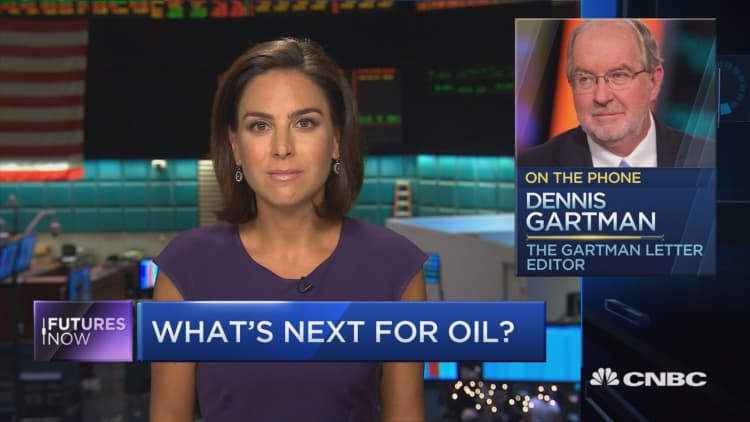Russian President Vladimir Putin's seemingly cozy talks with Saudi Arabia could put a floor under oil prices, possibly limiting what could have been a sharp drop later this month.
In a surprise move over the long Labor Day weekend, Russia and Saudi Arabia agreed to cooperate in world oil markets. There was no immediate deal to act but they say they are moving toward a strategic energy partnership and could take action in the future. The joint statement was signed by both countries' oil ministers on the sidelines of the G-20 summit in China, after a meeting between Putin and Saudi Deputy Crown Prince Mohammed bin Salman.
While skepticism swirled that the world's two biggest oil producers would actually strike a deal, the fact they are talking and publicly seeking to cooperate is a big step. The crude market was surprised by the announcement that came out of the G-20, because it had not been prepared for anything but chatter ahead of a meeting between OPEC and non-cartel producers in Algeria at the end of the month.

Oil prices fluctuated, jumping sharply on the news, which was released on the Labor Day holiday. But U.S. oil futures settled with smaller gains Tuesday, when the market resumed normal trading, and traders began dismissing the potential for a deal.
"I think the market is missing the story," said Helima Croft, global head of commodity strategy at RBC. "They're just going back and saying nothing came of this. We really had incremental change. When Putin is putting his weight behind something, I wouldn't rule it out."
Croft said unlike past efforts by OPEC and Russia to do a deal to stabilize oil prices, this one has Putin's full involvement.
"People are so bearish at the moment and they just think OPEC has no credibility. Vladimir Putin was silent in the runup to Doha. He said nothing and the fact that he came out and praised Mohammed bin Salman saying this is the right thing to do, Putin's putting his personal capital in this and I think that's a different element," said Croft.
The Doha, Qatar, meeting in April ended in failure after Iran would not agree to freeze production, and Saudi Arabia refused to freeze unless all producers cooperated. But now Iran is very close to its pre-sanctions level of output. The country was sanctioned for its nuclear program and its oil exports were limited.
Bin Salman headed the Saudi delegation at the G-20 summit, and the 31-year-old is seen as a rising power. He oversees the military and energy sector and is behind the country's major economic reform program.
Hurt by low oil prices, the kingdom has been burning cash, and the prince is attempting to diversify the economy away from oil. Part of the plan is to issue stock in the national oil company, Saudi Aramco, and create a massive $2 trillion sovereign wealth fund.
Saudi Arabia, like other producers, is clearly feeling the pinch from low oil. The kingdom was also reported to be talking up at the G-20 meeting a coming $15 billion debt offering, which has seen especially strong interest in Asia, according to the Financial Times.
"The line in the sand for the Saudis seems to be $40," said John Kilduff of Again Capital. He said that also appears to be a floor for now. "There's a fear they could come together. These low prices are pushing this disparate group into each other's arms."
West Texas Intermediate closed up 39 cents Tuesday, ending at $44.83 per barrel.
Oil strategists had been expecting a dip in crude prices, due to the refining maintenance season and the continued build of oil supplies. Each year between late August and October, U.S. refineries slow their intake of crude so they can prepare for winter fuel production. That means already high inventories could grow, adding to oversupply and sending prices lower.
Even though strategists see the market as rebalancing from a deep oil glut, an oversupply of gasoline has also been working through the system after a summer of high production.
"They've had some success talking the market up so they'll stay at it. There's enough people believing that for now, that there's a floor," said Kilduff.
He said oil prices normally would be falling due to reduced refiner demand just about the time OPEC nations meet on the sideline of an energy conference that begins Sept. 26 in Algiers.
"It's only going to get louder between now and the end of September," said Dan Pickering, co-president of Tudor, Pickering, Holt & Co.
"I think it's not coincidental that Saudi started talking more positive at the same time the net short level in crude was at record levels. I think these guys understand their power in the marketplace and they're willing to use it. Russia, Saudi Arabia, Iran, all of them are pretty close to full capacity ... but Saudi at 10.7 million barrels a day, they could freeze and still be at the highest level they've been at on a sustained level ever."
Kilduff said if there is no deal that could be a setback for prices, and the influence of the maintenance season could again kick in.
"I think that's where this thing ends badly for them. The shoulder (maintenance) season will be at its height right about then," he said.
"I think it ultimately fails but certainly their rhetoric is good enough to keep above that level," Kilduff said.


